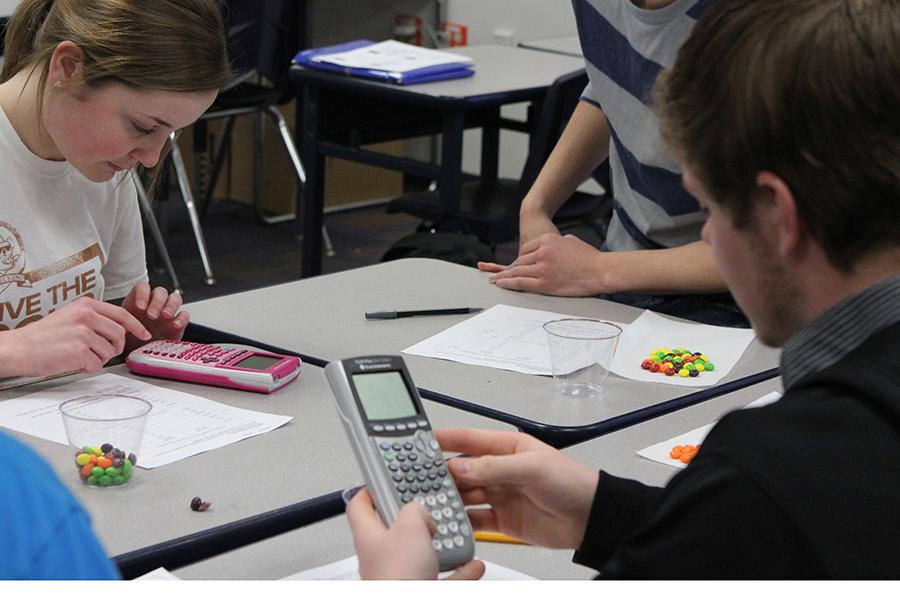A taste of what’s coming
As the Common Core State Standards curriculum nears its arrival, the question has changed from “What’s CCSS” to “Are we ready for CCSS?”
While students are the demographic of public education they are completely unaware of how much teachers put into the preparation to teach every day.
“I think teachers get an idea of what to teach when they write curriculum,” Jackson Aubrey (10) said. “Then they each take that information and design their lessons.”
Although there’s a general understanding of how classes are run, students are not privy to the mechanics behind all that goes into building a lesson.
“I think there are some state guidelines they have to follow,” Austin Dahl (12) said. “They make and keep those lessons for a few years and tweak little things so it seems special and personalized when it’s already been used, or they steal [lessons] from other teachers.”
In reality, this teaching task is shaped by curricula and standards defined by the state. Teachers aren’t handed instructions on how to teach each day, this lesson designing is one of the creative tasks of the profession.
A new set of standards that emphasize critical thinking and problem solving called the Common Core State Standards have been adopted by 45 states. The number as of March 24, has changed to 44 as Indiana, an early adopter, has withdrawn from the CCSS.
What students do know is that any new skill requires training, and that familiarity mainly stems from sports.
“We do a lot of stuff similar to games in order to prepare,” Cole Stamper, varsity baseball player, said. “So when we get to the game days, it’s almost the same as practice.”
This system of practice and preparing for the game days directly mimics teacher preparation for the new implementation of Missouri Learning Standards or the CCSS, although every day next year is game day in the classroom as the CCSS proposes to prepare students for life.
“I have never heard of Common Core,” Timothy Borroff (12) said. “The fact that it’s coming next year, and I haven’t heard of it or hear my teachers talking about it is pretty surprising.”
CCSS, discussed in Altering the make-up of learning standards, will change the way students are taught in the hopes of molding a future generation of innovative learners.
Ms. Laura Medrala, Language Arts teacher, has attended approximately 10 school days of curriculum writing, and volunteered to help with weaving CCSS into curriculum.
“I believe going to the curriculum writing has helped me,” Ms. Medrala said. “I’ll admit that there’s definitely more I need to know. Whether it’s someone coming in and teaching me one-on-one or researching more about it.”
With teachers involved in the curriculum writing as well as learning strategies to emphasize CCSS, administrators and faculty are trying their best to prepare themselves.
“Teachers have constantly gone through training since 2011,” Mrs. Lisa Lingle, secondary math content facilitator, said. ” I’ve done numerous workshops with teachers either during the school year or in the summer explaining the mathematical practices, which are really a habit of mind.”
Ms. Lingle has personally visited three of the four high schools in order to share the new standards and offer her insight.
Buildings have provided professional development for teachers. As a high school, EHS has offered four hours of training since last April with another hour planned for April 21.
Rockwood School District has known about the change in learning standards since 2011, according to Dr. Terry Adams, superintendent.
“Quite frankly, we’ve known about this for a while now,” Dr. Adams said. “The government planned the implementation for the 2014-2015 school year, so we had knowledge that this was coming.”
The middle schools have been implementing CCSS for three years, so when current 8th graders reach high school, where CCSS will be in use, there will be no learning gap, according to Ms. Lingle.
However, as implementation time approaches, teachers are feeling the pressure. The Mathematics faculty has been slowly implementing this new approach to learning: engaging students to wrestle with information rather than regurgitating facts.
“In writing that curriculum, we’ve tried to embed the Common Core as much as we possibly can,” Ms. Mary Wisdom, Mathematics Department chair, said. “We’re encouraging the kids to do more discovery learning and making the questions more application level. That’s the biggest shift.”
An old question reads, “If 3(y-1) = 8, then what is y? This question is an example of solving equations in a series of mechanical and memorized steps.
A CCSS-aligned question states, “What are two different equations with the same solution as 3(y-1) = 8?” The updated question shows a shift from the previous exam, and emphasizes a more complex process of reasoning.
Instead of being able to memorize equations or know the numerous steps for each problem, there is more of an emphasis on critical thinking.
“I guess I can see some changes,” Elizabeth Emery, two-year algebra student, said. “It’s not just memorizing stuff and spitting it out anymore. We practice in class a lot more than we used to, and after a while it becomes like second nature. It’s different; I don’t know if I like it.”
The changes this school year may be minute compared to what will be coming in the 2014-2015 school year.
“I guess I can see some changes from my freshman year to now,” Borroff said. “I used to be able to sit through classes and get A’s because it wasn’t exactly learning. Teachers would literally tell you what was on the test. I’m not sure if it’s because I became an upperclassman or because of these standards, but I have to study more. Things aren’t just handed to you. It’s more like the real world.”
The CCSS curriculum will completely change the way students learn and the way they are tested, as seen in both a kindergarten test, as well as an 11th grade language arts exam.
Another hurdle may be student’s lack of familiarity with the test and its program.
“It’s a lot to understand,” Mrs. Cheryl Abbott, Mathematics teacher, said. “It’s not too complex when you get to know the program, but it gets more complex when you try to execute it.”
Although the school administrators and department chairs say they’re ready for this change, other data challenges their claims.
Dr. Jim Wipke, Executive Director of Secondary Education, issued a district-wide survey during the fall of 2013 asking teachers if they’re ready for the new implementation. The results were not only surprising but unnerving. An overwhelming amount of teachers and administrators are far from ready for the CCSS arrival, according to Dr. Wipke’s survey.
“The results are not surprising, overall teachers everywhere in the district are in that transition period with Common Core,” Deborah Asher, head principal, said. “I think there’s a higher understanding of what is going to happen and what’s expected with the rigor of the learning standards. But, I think what they’re needing work with is how they’re going to implement it.”
“It’s extremely nerve-wracking,” Ms. Becky Stevenson, English Department chair, said.“We are in charge of students learning, and we don’t want to mess this up. It’s very scary for me.”
With less than six months until the official arrival, time is ticking and teachers are scrambling, but the administration is unfazed.
“I don’t think teachers are scared of the new standards,” Mrs. Lingle said. “I think they all have a high amount of respect for the program.”
The administration seems to have a positive outlook on this new shift in learning.
“I would say this,” Dr. Adams said. “In any school district that is as prepared as it could possibly be, there would still be some degree of uneasiness on the part of staff because it is new.”
District-wide, administrators have been working hard to prepare themselves. Along with PLC days, teachers have met with their department heads on an individual basis to solidify their understanding. EHS Professional Learning Opportunities are available, as well. Teachers come to seminars during their plan periods in order to understand and practice the new standards.
All of the training has made positive impacts, but there’s still an underlying sense of worry.
“Our content facilitator [Mrs. Lingle] has done a very good job of preparing us for the Common Core,” Mrs. Wisdom said. “I think she, as well as the department, has prepared us pretty well. But I think if people aren’t prepared, it comes from the top down.”
As the information filters down from content facilitators, to department heads, the real question is if regular teachers feel prepared.
“I think Rockwood has always been ahead of the curve when it comes to styles of teaching,” Mrs. Patrice Willard, Mathematics teacher, said. “CCSS wasn’t hard to understand, it just became messy when implementing it. I really do feel like Mary Wisdom has done more than enough to prepare us. If someone does feel ill-prepared, I would point my finger at the individual instead of the department. People have to take the initiate if they don’t understand something.”
Mrs. Willard isn’t alone in this sentiment.
“It comes with the profession,” Mrs. Abbott said. “There will be changes, and teachers have to be willing to invest time into understanding it. Common Core is a big shift, so learning it is also a big shift. It will take time, a lot of it.
These Mathematics Department teachers are looking at the long-term.
“I think the district and EHS are preparing,” Mr. Matt Hovelmann, Mathematics teacher, said. “That’s the best way to put it. It’s in process. We won’t be ready entirely by August. It’s not completely done and in place.”
So, if teachers feel ill-prepared, Dr. Matt Frederickson, director of curriculum, encourages teaches to educate themselves if they don’t feel as though they have received enough training from the district.
“High school administrators are leading the professional development in their building with many reaching out to our department for assistance,” Dr. Frederickson said during a phone interview conducted, March 31. “As you can see, we have done and are doing quite a bit. However, those that also seek out their own learning (through workshops or courses or reading articles, etc.) would possibly be even further in their own understanding.”
With some teachers feeling unprepared, administrators preaching that RSD is as prepared as possible and various faculty falling somewhere in the middle, the grounds to implement CCSS are a bit shaky.
“Are we going to be perfect? No,” Ms. Asher said. “It’s an evolving process. Just like the students are learning as they go along in the classrooms, the teachers are learning as they become more comfortable with it. But there will not be a lessening of education at EHS because the standards have changed.”
Ready or not, Common Core is coming.
Your donation will support the student journalists of Eureka High School - MO. Your contribution will allow us to purchase equipment and cover our annual website hosting costs.

















